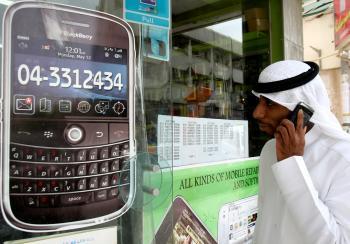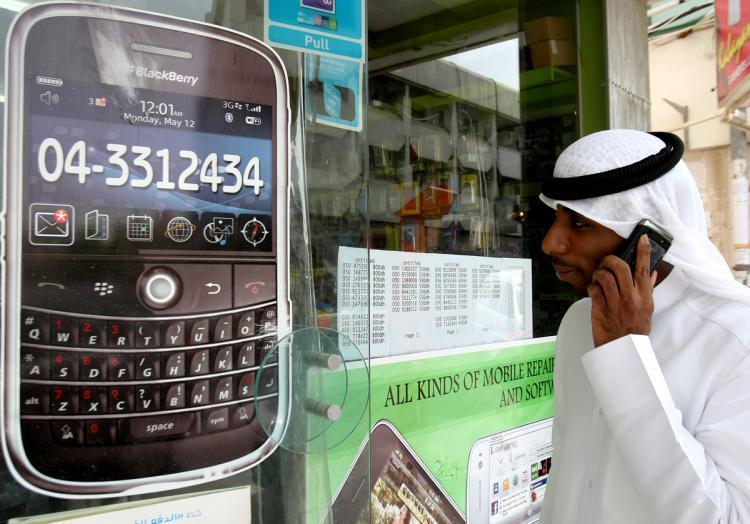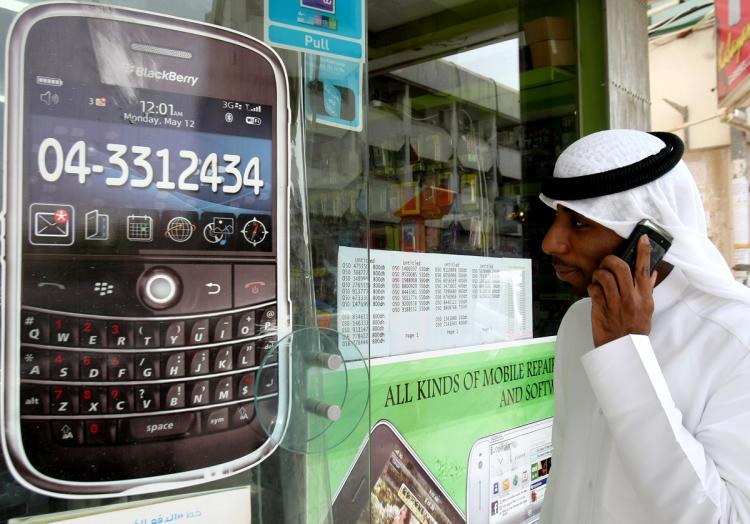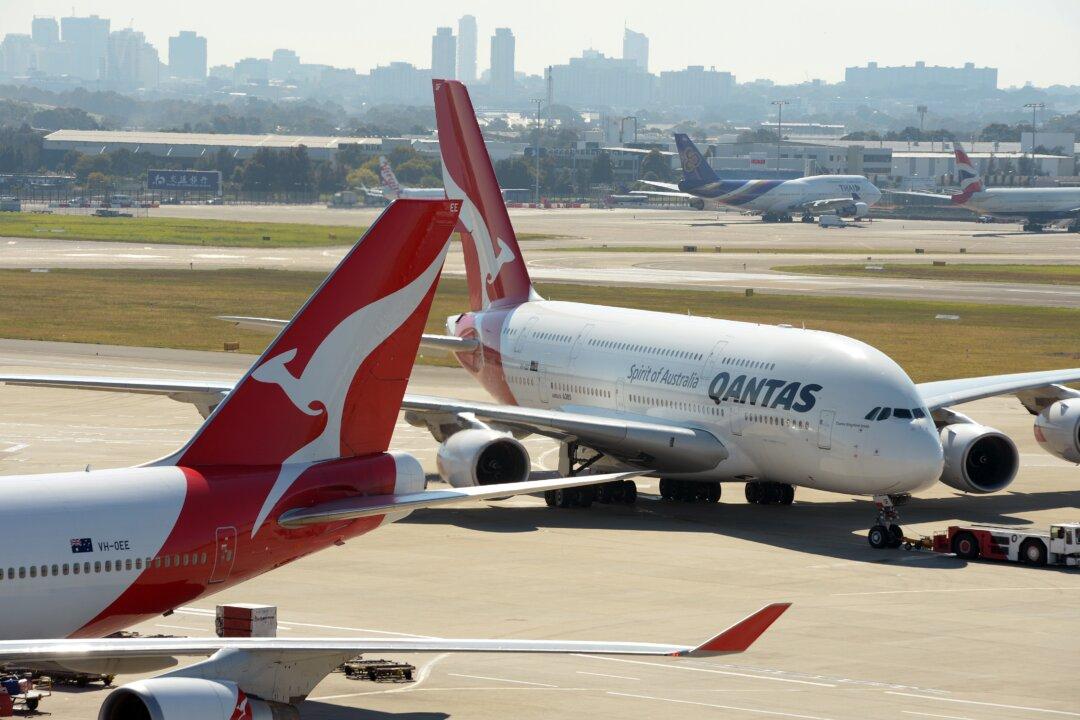DUBAI, United Arab Emirates—Government regulators in Saudi Arabia and the UAE announced plans to cut key BlackBerry services, after the developer behind the popular smartphone brand refused to give officials access to user records.
The announcements on Sunday come after more than three year’s negotiation with BlackBerry developer Research in Motion (RIM) over the possibility that a server be based in each respective country and that officials be given access.
The device uses an advanced encryption technology, which makes intercepting mail and messaging communications difficult for government censors.
“In their current form, certain BlackBerry services allow users to act without any legal accountability, causing judicial, social and national security concerns for the UAE,” the country’s Telecommunications Regulatory Authority said in a statement via the official WAM news agency.
The suspension of services, which will take effect on October 11, will include BlackBerry messenger, mail and web-browsing. The Saudi suspension will only involve BlackBerry messenger.
“UAE took a bolder step than Saudi Arabia whereas Saudi Arabia is only banning one, the Messenger,” said Saudi Telecom board member Abdulrahman Mazi, speaking on the Arabic language channel, Al Arabiya TV.
“I hope this is only a kind of pressure on Research In Motion to take steps to provide information when needed.”
The ban follows concern in Bahrain, Kuwait and last week India over the possibility that criminals may use the anonymity provided by BlackBerry to undermine national security.
However, issues may have arisen over the difference in the perception of crime between austere Gulf monarchies and Canada-based RIM.
Badr Ali Saiwad Al Dhohori, an 18-year-old living in the UAE was arrested after attempting to use his BlackBerry messenger to organize a protest against petrol pump fuel hikes, Reporters Without Borders said in a statement.
He has been detained since July 15, and police are attempting to trace others who he sent the message to, the report said.
Any demonstration in the UAE requires a security permit from police, which is extremely difficult to obtain.
A week after the alleged arrest, Reporters Without Borders issued a statement warning that BlackBerry “operates beyond UAE law.”
Speaking about the Al Dhohori case, the NGO called for an end to a “witch hunt” against BlackBerry users.
“These young people did nothing bad,” a spokesman said.
“At first they planned a peaceful demonstration but they ended up calling it off because they did not want to break the law. They must not be made to pay for the government’s dispute with BlackBerry’s services, which it cannot control as it would like.”
There around 500,000 BlackBerry users in the UAE, who have been offered the services since 2006 by the country’s two telecom companies Etisalat and Du. Both companies said that they would comply with the TRA’s ruling, and would offer customers “alternative” services.
Last week, India warned that it would ban BlackBerry services if RIM did not allow officials access to server records.
Officials there said they were investigating unverified reports that RIM had established servers in the tightly regulated market of China and granted local officials access.
The reports have also drawn attention from UAE regulators, who believe the same treatment should be applied across the board.
“Blackberry appears to be compliant in similar regulatory environments of other countries, which makes non-compliance in the UAE both disappointing and of great concern,” said Mohammed Al Ghanim, director general of the TRA in a statement.
A spokesman for RIM was unavailable for comment on Sunday.
However, in a statement in 2008 over Indian officials’ attempts to gain access to RIM’s user data, the company said that it does not possess a “master key.”
“RIM would simply be unable to accommodate any request for a copy of a customer’s encryption key since at no time does RIM, or any wireless network operator, ever possess a copy of the key,” the company said at the time.
The announcements on Sunday come after more than three year’s negotiation with BlackBerry developer Research in Motion (RIM) over the possibility that a server be based in each respective country and that officials be given access.
The device uses an advanced encryption technology, which makes intercepting mail and messaging communications difficult for government censors.
“In their current form, certain BlackBerry services allow users to act without any legal accountability, causing judicial, social and national security concerns for the UAE,” the country’s Telecommunications Regulatory Authority said in a statement via the official WAM news agency.
The suspension of services, which will take effect on October 11, will include BlackBerry messenger, mail and web-browsing. The Saudi suspension will only involve BlackBerry messenger.
“UAE took a bolder step than Saudi Arabia whereas Saudi Arabia is only banning one, the Messenger,” said Saudi Telecom board member Abdulrahman Mazi, speaking on the Arabic language channel, Al Arabiya TV.
“I hope this is only a kind of pressure on Research In Motion to take steps to provide information when needed.”
The ban follows concern in Bahrain, Kuwait and last week India over the possibility that criminals may use the anonymity provided by BlackBerry to undermine national security.
However, issues may have arisen over the difference in the perception of crime between austere Gulf monarchies and Canada-based RIM.
Badr Ali Saiwad Al Dhohori, an 18-year-old living in the UAE was arrested after attempting to use his BlackBerry messenger to organize a protest against petrol pump fuel hikes, Reporters Without Borders said in a statement.
He has been detained since July 15, and police are attempting to trace others who he sent the message to, the report said.
Any demonstration in the UAE requires a security permit from police, which is extremely difficult to obtain.
A week after the alleged arrest, Reporters Without Borders issued a statement warning that BlackBerry “operates beyond UAE law.”
Speaking about the Al Dhohori case, the NGO called for an end to a “witch hunt” against BlackBerry users.
“These young people did nothing bad,” a spokesman said.
“At first they planned a peaceful demonstration but they ended up calling it off because they did not want to break the law. They must not be made to pay for the government’s dispute with BlackBerry’s services, which it cannot control as it would like.”
There around 500,000 BlackBerry users in the UAE, who have been offered the services since 2006 by the country’s two telecom companies Etisalat and Du. Both companies said that they would comply with the TRA’s ruling, and would offer customers “alternative” services.
Last week, India warned that it would ban BlackBerry services if RIM did not allow officials access to server records.
Officials there said they were investigating unverified reports that RIM had established servers in the tightly regulated market of China and granted local officials access.
The reports have also drawn attention from UAE regulators, who believe the same treatment should be applied across the board.
“Blackberry appears to be compliant in similar regulatory environments of other countries, which makes non-compliance in the UAE both disappointing and of great concern,” said Mohammed Al Ghanim, director general of the TRA in a statement.
A spokesman for RIM was unavailable for comment on Sunday.
However, in a statement in 2008 over Indian officials’ attempts to gain access to RIM’s user data, the company said that it does not possess a “master key.”
“RIM would simply be unable to accommodate any request for a copy of a customer’s encryption key since at no time does RIM, or any wireless network operator, ever possess a copy of the key,” the company said at the time.






